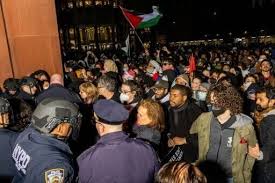
In recent weeks, some of America’s most prestigious universities have become battlegrounds for protests as students and activists express their outrage over the Israel-Hamas conflict and the humanitarian crisis in Gaza. The protests have escalated tensions on campuses, leading to disruptions in campus activities and mass arrests.
At Columbia University in New York, which has been a focal point of the protests, organizers are demanding that the university divest from companies profiting from what they term as “Israeli apartheid, genocide, and occupation in Palestine.”
However, the protests have also sparked concerns about safety and accusations of anti-Semitism. Pro-Israel supporters and others have pointed to anti-Semitic incidents during the protests and have criticized what they see as intimidation and hate speech on campuses.
Columbia University’s vice president of public affairs, Ben Chang, emphasized that while students have the right to protest, they must not disrupt campus life or engage in harassment and intimidation. He mentioned ongoing discussions with demonstrators and concerns raised by Jewish students about their safety on campus.
The situation has divided the student body, with some Jewish students expressing feeling unsafe due to what they perceive as rising anti-Semitism, while others participating in the protests assert they are there to show solidarity with Palestinians and disavow any anti-Semitic actions.
The protests have not been limited to Columbia University. At New York University (NYU), 133 people were arrested after protests escalated, leading to disorderly behavior and anti-Semitic incidents. Similar demonstrations have taken place at other universities across the country, including MIT, the University of Michigan, UC Berkeley, and Yale.
The unrest has caught the attention of President Joe Biden’s administration, with US Secretary of Education Miguel Cardona condemning anti-Semitic hate on college campuses as unacceptable.
Sources By Agencies


